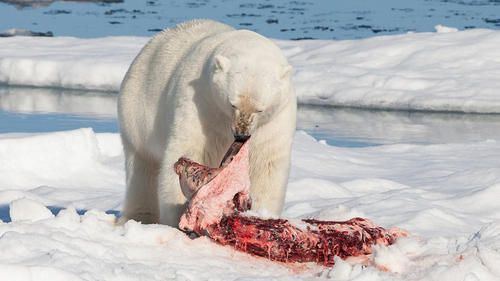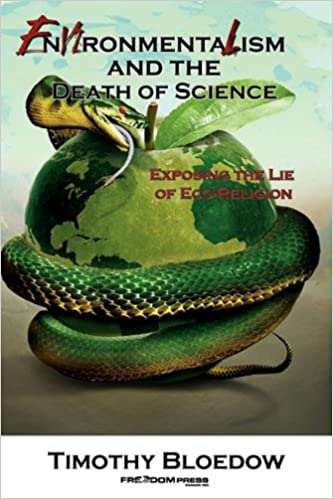
The famous American architect Frank Lloyd Wright once said, ‘I believe in God, only I spell it Nature’. His words sum up the tragic error of those who confuse worship of the created with worship of the Creator.
The idolisation of nature (or Nature Worship) is nothing new, of course. Man has lived in fear of ‘nature gods’ and especially ‘weather gods’ – and has performed sacrifice and penance to appease their anger – since time immemorial. Today, with the collusion of the liberal mass media, the environmental movement has successfully turned man’s historic fear of climate into an alarmist climate of fear!
The world has seen an average temperature rise of a single degree over recent decades, far less than warmings that occurred in the Roman and Medieval periods. Yet the modern environmental movement has taken the path of pseudo-science, via computer modelling techniques, to a prophetic apocalypse.Doomsayers appear nightly on our TV screens to relate their cataclysmic insights, preaching their climate-change gospel and calling us to the salvation offered by Green Morality. In all of this you might be forgiven for perceiving the vision, language and tone of a new religious faith. And you would not be alone.Environmentalism as religion
Novelist and science writer Michael Crichton writes, ‘One of the most powerful religions in the Western World is environmentalism. Environmentalism seems to be the religion of choice for the urban atheists. Why do I say religion? Just look at the beliefs … you see … a perfect 21st century remapping of the traditional Judeo-Christian beliefs …
‘There’s an initial Eden … a state of grace and unity with nature; there’s a fall from grace into a state of pollution as a result of eating from the tree of knowledge; and, as a result of our actions, there is a judgment day coming for us all.‘We are all energy sinners, doomed to die, unless we seek salvation, which is now called sustainability. Sustainability is salvation in the church of the environment. Just as organic food is its communion …‘Eden, the fall of man, the loss of grace, the coming doomsday – these are deeply held mythic structures. These are not facts that can be argued. These are issues of faith’.The modern environmental Green agenda turns out on closer scrutiny to be 10% dubious interpretation of historic data and 90% irrational prediction.Sense of guilt
Crichton is not alone in observing that the movement no longer wears scientific ‘clothes’. Czech president Vaclav Klaus, speaking to a US audience in March 2007, said:
‘Environmentalism should belong in the social sciences, much like the idea of communism or other isms … Environmentalism is a religion that seeks to reorganise the world order as well as social behaviour and value systems worldwide’.
Lord Nigel Lawson, economist and former Chancellor of the Exchequer in Margaret Thatcher’s Government, adds:
‘It is not difficult to understand … the appeal of the conventional climate-change wisdom. Throughout the ages something deep in man’s psyche has made him receptive to “the end is nigh” apocalyptic warnings.‘We, as individuals, are imbued with a sense of guilt and a sense of sin – even collective guilt and collective sin. This in turn spawns a new religion of Eco-fundamentalism whose new priests are scientists (well rewarded with research grants) rather than the clerics of established religions’.Cardinal George Pell, quoted in The Australian, declares: ‘Pagan emptiness and fears about nature have led to hysteric and extreme claims about global warming. In the past pagans sacrificed animals and even humans in vain attempts to placate capricious and cruel gods. Today they demand a reduction in carbon dioxide emissions’.James Lovelock’s climate-change blockbuster, The revenge of Gaia advances the claim that Mother Earth is exacting revenge on humans for despoiling her. British MP and writer Boris Johnson comments:‘The more one listens to … Lovelock, and the more one studies public reactions to his prophecies, the clearer it is that we are not just dealing with science … this is partly a religious phenomenon. Humanity has largely lost its fear of hellfire, and yet we still hunger for … an eschatology and a moral counterbalance to our growing prosperity.‘All that is brilliantly supplied by climate-change. Like all the best religions, fear of climate-change satisfies our need for guilt, and self-disgust, and that eternal human sense that technological progress must be punished by the gods’.American writer John M. Ostrowski notes: ‘the prime threat to Mother Gaia is anthropogenic [man-made] climate change’. He continues, ‘Like other religions, environmentalism is a human-centred one’ which has ‘a strong emphasis on the end of the world. Fear mongering and predictions of the apocalypse are the primary evangelising tools of environmentalists’.The new orthodoxy
But Ostrowski also points out something else – for modern environmentalists ‘humans are the problem’. He quotes Greenpeace co-founder Patrick Moore (now disaffected with the environmental movement) as perceiving former environmentalist colleagues to be ‘anti-human’.
Martin Livermore is an independent consultant on science and policy issues. He points out, ‘The new orthodoxy teaches that mankind is guilty of Original Sin by despoiling Eden (the pre-Industrial world). This guilt must be assuaged by repairing the damage and protecting all other forms of life’.For the deepest Greens, the only real solution is the disappearance of our species from the Earth – the ultimate sacrifice. For many others a much smaller ‘optimum population of humans is a desirable goal’.
Environmental activist Paul Watson confirms the growing orthodoxy that ‘We are killing our host Planet Earth’. Citing Robert Malthus (the 18th century English political economist who complained that man was overpopulating the earth), Watson has described mankind variously as ‘a virus’ and ‘the AIDS of the Earth’.Watson wants ‘vast areas of the planet where humans do not live at all and where other species are free to evolve without human interference’. He adds, ‘We need to radically and intelligently reduce human populations to fewer than one billion’ and ‘return to primitive lifestyles’.Toxic terror
Christopher C. Horner, Senior Fellow at the US Competitive Enterprise Institute, rightly notes, ‘When normal humans look at another human, we see a mind, a soul and a set of hands. The Greens see only a stomach’.
It doesn’t take much to make the intellectual link between the fervour of the anti-Judeo-Christian, anti-human agenda of Liberalism – with its emphasis on abortion, euthanasia and depopulation – and the unparalleled opportunity that the climate-change gospel affords to achieve that agenda through political means.In his article Why I don’t believe God is Green, Dominic Lawson writes, ‘The Green gospel … regards birth control as the greatest of all moral obligations and … abhors the idea that man should be master of the planet instead of nature itself’.In her book Toxic terror, Elisabeth Whelan quotes Charles Wursta, chief scientist for the US Environment Defence Fund, on how the worldwide ban on DDT (which had virtually wiped out malaria as a global killer) was likely to lead to millions of deaths. He comments, ‘This is as good a way to get rid of them [poor Africans] as any’.Even though scientists had proved that DDT was not carcinogenic, the environmentalists forced through a ban anyway. It is conservatively estimated that over the four decades following the ban, between 10 and 30 million people, mostly children in sub-Saharan Africa, died from malaria as its direct consequence.Judging all things
Few Christians understand the links between the beliefs and policies of Western Liberalism and those of the modern Green movement. The mass media’s irrepressible appetite for scaremongering should alert us to be far more discerning. After all, we have witnessed the media’s litany of failure on global pandemic predictions, including the YK2 electronic bug, Hong Kong flu, bird flu, the return of TB, and so on.
The response that ‘God tells us to be good stewards of the Earth’ can be simplistic. He does indeed. But his creation ordinance, ‘Be fruitful and multiply and fill the Earth and subdue it …’ (Genesis 1:28) also happens to run counter to the depopulation policies of modern environmentalism.We should remember Christ’s statement that the spiritual believer ‘discerns [judges] all things’ – especially, we might think, the key issues of the day.Meanwhile the liberal-dominated media turn to experts with New Age beliefs like James Lovelock, who delivers the headlines they want and we remember – statements like, ‘Billions will die as human civilisation flees the cracked and broken earth to the Arctic, the last temperate spot, where a few breeding couples will survive’.Odd, since Jesus prophesied that life would continue ‘as the days of Noah’ with people ‘eating and drinking, marrying and giving in marriage’ until he returns (Matthew 24:37). No suggestion there of a desperate remnant stranded on the Arctic tundra. Perhaps the prophets of environmental doom know something Jesus didn’t?
To be concluded
www.petercglover.com. The author is also the site editor at www.globalwarminghysteria.com














